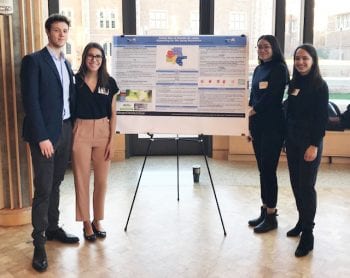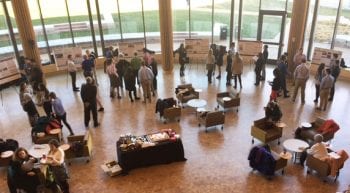Effective community engagement requires mutual trust, reflective dialogue, and enduring roots in community. The Gephardt Institute values and advances this process through the development of Community-Engaged Teaching and community partnerships.
In her role as Assistant Director for Campus and Community Partnerships, Stefani Weeden-Smith leads the institute’s strategy and vision for community engagement models that are responsive, sensitive, sustainable, and responsible. From the community standpoint, Weeden-Smith serves as a key access point for stakeholders seeking partnership or support from WashU. Similarly, she is a resource for WashU colleagues in identifying community partners and building capacity so they can foster effective relationships that align with community needs.
In addition to cultivating new partnerships, the Gephardt Institute considers best practices and ways to strengthen existing partnerships over time to ensure they meet the needs of all stakeholders while also aligning with university goals. When cultivating and evaluating partnerships, institute staff consider the arc of the relationship and how to appropriately exit community once the partnership is complete.
Over the past year, Weeden-Smith has supported community engagement models in coordination with instructors for a range of Community-Engaged Courses, including When I’m Sixty-Four: Transforming Your Future and Social Work Practice with Organizations and Communities (Practice II). Learn about the courses and approaches to partnership development below.
When I’m Sixty-Four: Transforming Your Future
When I’m Sixty-Four is an interdisciplinary course for first-year undergraduate students. The course was introduced in the fall of 2014 and is co-instructed by Dr. Brian Carpenter (professor of Psychological and Brain Sciences), Dr. Nancy Morrow-Howell (Bettie Bofinger Brown Distinguished Professor of Social Policy; director, Harvey A. Friedman Center for Aging), and Dr. Susan Stark (associate professor of Occupational Therapy, Neurology, and Social Work).
Today’s first-year students have a 50 percent chance of living to see their 100th birthdays, and When I’m Sixty-Four helps students imagine the implications of this demographic revolution on their personal and professional lives. Students interact with leaders and researchers from many fields, including medicine, engineering, architecture, public health, social work, law, business, art, psychology, and anthropology. They also engage in a group project with a partner agency that explores the community partner’s age-readiness. If the partner agency is a restaurant, for example, students consider the accessibility of seating and service areas for patrons with aging-related physical changes. They also consider the aging of the restaurant workforce and how policies could be modified to support continued work as we age. Students gain the knowledge and skills to explore these issues with community partners.
The search for partner organizations and agencies typically begins in early June for this fall semester course. Weeden-Smith and the course instructors look for partners who do not primarily serve older adults. They also consider potential timing and privacy issues. Students work with partners throughout the semester and give poster presentations at a culminating event on campus.
The Independence Center is a recent partner that provides a community-based rehabilitation program for adults with severe and persistent mental illnesses in the St. Louis area. Students had the opportunity to visit the organization and participate in discussions on the complexities of mental illness and approaches to community-based care. They explored how this might change in the coming years as the population of older adults grows. Professor Stark noted that, “The experience gave them confidence in their new knowledge and showed them first-hand how they might be able to make a difference in society.” Weeden-Smith added that, “The domino effect that these conversations had on student learning showcased the impact of the partnership. We look forward to engaging with Independence Center again in the future.”
Social Work Practice with Organizations and Communities (Practice II)
Practice II is a required foundation course for first-year graduate students in their second semester at the Brown School of Social Work. Janelle Gibson (senior lecturer, Brown School) serves as the course instructor and coordinator. The course helps students to apply academic learning and develop social work practice skills through partnerships with local organizations around community-based questions. Weeden-Smith works with Gibson to identify project topics and often hears how the course deepens students’ engagement in community, even after it ends.
Recent Practice II projects have centered on questions like the following:
• What is the status of diversity issues at a women’s issues-based non-profit organization – from the level of the board to staff to clients, and how might it be enhanced?
• Where are financial institutions relative to unbanked populations in St. Louis, and what are effective strategies for reaching unbanked populations?
• Where are Bosnian immigrant populations in St. Louis, and what are their possible mental health issues and preferred means for addressing them?
In each project, students collaborate with a community partner to identify the stakeholders of a given organizational or community-based issue, assess the issue with stakeholders and through research, and recommend strategies for addressing the issue within the organizational or community context. Students work in small groups and prepare a final paper and presentation that they share with community partners.
When asked about her approach to developing these relationships, Weeden-Smith emphasized her focus on shared communication and a desire for WashU community members to deepen their understanding of issues in the St. Louis region. “We really try to listen to the community and ensure that there is a two-way street in our relationships,” she said. “I continue to be excited about what happens with these partners, as the connections are often bigger than expected. I always look forward to the next year and new ways to reinforce these bonds.”
Professor Stark added that the impact extends beyond WashU students and community partners. “They become armed with information that will help them thrive,” she said. “Personally, I know our students have started to have important conversations with their family and friends about aging. They have information that will help their families live the fullest life possible.”
To learn more about our campus and community partnerships, contact Stefani Weeden-Smith.

